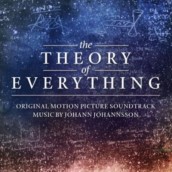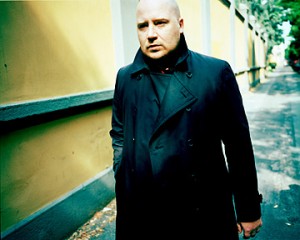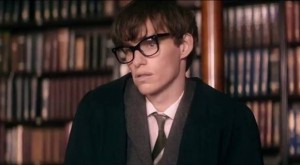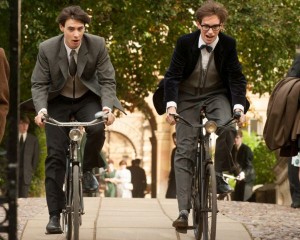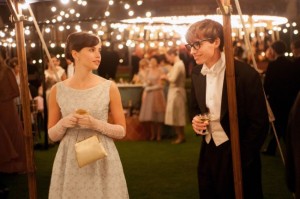One could say it’s the cold, volcanic icescape of the earth’s most forbidding land mass that have often infused Johann Johannsson’s music with a beautifully foreboding presence. Like his innovative countrywoman Bjork, Johannsson received art-music acclaim by merging modern classical and alternative music to haunted and mesmerizing effect, creating a series of conceptual albums like “Englaborn” and “Dis” at the same time he began scoring a myriad of shorts, features and documentaries – usually involving brooding, disaffected characters he could apply a psychologically-minded musical style to (even giving ennui to prairie dogs in the process). With his songs playing a major part in WICKER PARK‘s soundtrack, Johannsson segued to English-language fiction with the 2009 Ashton Kutcher film PERSONAL EFFECTS, then gave an eerily gripping threat to David Morse’s rogue cop in McCANICK. But the true, eerie thunderbolt of Johannsson’s transfixing and often unsettling style came with the major studio release of PRISONERS. Using agonizingly slow, sustaining melodies, percussive menace, and a church-like organ, Johannsson’s impressively thematic score created a sense of moral guilt like few crime thriller scores before as it depicted a father’s tragic path down the rabbit hole of vigilantism.
Given how icily minimalist Johannson’s music can be, you wouldn’t think of him as being the composer to come up with an emotionally warm, mainly upbeat score, especially when put in the face of a character’s physical catastrophe. But that’s exactly what he does for THE THEORY OF EVERYTHING, creating a smart, yet accessible score that personifies a scientist who’s turned seemingly indecipherable ideas about the time-space continuum into best-selling books – universe-spanning ideas that have awarded him rock star status. However, the cosmic joke is that Stephen Hawking is practically immobile, a sense of humor not lost on him or this biopic by MAN ON A WIRE‘s James Marsh. Tracing Hawking at the start of his seemingly lethal descent into ALS, while at the same time signaling the birth of the romantic relationship that saved his life, THE THEORY OF EVERYTHING is everything but the sort of mawkish, life-affirming disease-of-the-week movie Hollywood usually offers, especially given this now “hip” ice-bucket challenge disease.
Beyond its excellent performances by Eddie Redmayne as Hawking and Felicity Jones as his first wife Jane, a major reason why THEORY sings the body electric is due to Johannsson’s rhythmic, sparkling but no less serious score that brings affecting humanity to the story, as well as a cosmos-spanning sense of discovery that can improbably leap from a world of debilitation. For audiences only familiar with PRISONERS, Johannson’s work is nothing less than a “Eureka!” moment, full of poignant, waltzing revelation of warmth that put THE THEORY OF EVERYTHING in the same kind of classically-minded, intelligently emotive universe occupied by the likes of Alexandre Desplat. Beginning with a sense of bubbling, string-driven rhythm that will always connote a mind on the move, Johannson’s gentle, propulsive melodies for strings, harp and piano gradually take on his more familiar, haunted, sampled sustains as the disease’s affects are felt. Yet it’s a mood that never stays long in a movie that doesn’t beat its music over the head with the message of never saying “Die.” Johannsson’s elegant melodies rise with smoothly flowing ideas, while also capturing the heartfelt emotion of a wife who goes beyond the cause of devotion while coming into the realization of her own needs. The overall effect of this composer’s THEORY is truly enrapturing as Johannsson enters the dramatic mainstream with melodic intelligence that distinguishes an intellectual approach that Stephen Hawking would likely admire.
Assignment X: How do you think the environment, and people of Iceland contributed to your music?
JOHANN JOHANNSSON: I think a person’s background and where they grow up always influences that they are and what they do, so I’m sure my Icelandic background has had an influence on my music somehow. Iceland has a very vibrant music scene and it’s a great place to grow as a musician – the scene is very collaborative and encourages experimentation and taking chances, and it greatly benefited me in my formative years as a composer.
AX: Would you say in a manner that you were “scoring” invisible movies with your concept albums before you became a film composer? And did that move you into wanting to compose to the real deal?
JOHANNSON: I’ve always felt the need to frame my music somehow, to have a conceptual dimension to my records. My albums ‘Fordlandia,” and “IBM 1401, a User’s Manual” have a documentary and historical aspect to them that in my mind is a very important part of their conception. I always think and write very visually – I often start with an image in my head when I’m writing – either a painting, a half remembered film scene or a passage from a book or a poem. So film composing came very naturally to me and feels like a very logical extension of my natural way of writing.
AX: Did film scores play a part in your development as a composer, and was it something you always had in mind to explore?
JOHANNSON: I’ve been a great fan of certain film composers for a long time. Discovering Bernard Herrmann was a big moment for me. I’ve always admired the way he works with harmony and the simplicity and clarity of his ideas. Morricone was an early influence as well. I’m a big fan of Georges Delerue, Wojciech Kilar, Zbigniew Preisner, and Ryuichi Sakamoto, to name a few.
AX: Having essentially quit studying music at 11, how difficult was it for you to adapt to the technical constraints of scoring to picture?
JOHANNSON: I studied literature and languages at University and I studied piano and trombone until age 18 or so, and then continued studying composition and music theory on my own. I’ve been writing music since I was 15 or 16 and recording music for as long. I had a lot of studio experience as well as experience writing theatre music for string and wind ensembles before I started writing for film, so it wasn’t a big technical jump for me to start writing for film.
AX: You’d worked on numerous Icelandic, and foreign shorts and features before scoring your first English language movie with PERSONAL EFFECTS. What was that experience like?
JOHANNSON: PERSONAL EFFECTS was a good experience. Although the film didn’t really find an audience, I’m quite proud of the music.
AX: What do you think of the power of the kind of minimal style of strings and drifting melodies that suffused PRISONERS and McCANICK and also play a smaller part in THE THEORY OF EVERYTHING?
JOHANNSON: I’ve developed a style that favors a kind of simplicity and directness, I think. I like music that is emotionally resonant and direct while being quite restrained and often introspective somehow. THE THEORY OF EVERYTHING score is more exuberant than PRISONERS for example, but they are also very different films and required different approaches. I was very conscious of reining in the emotion in the THEORY score – there is already a lot of emotion on screen and the music doesn’t have to repeat what’s already there. James and I were very much in agreement on this, that the music should only be there if it can add something.
AX: What was it about your music that attracted director James Marsh, especially given how non-minimal this score is? And what was your collaboration like?
JOHANNSON: James is a great collaborator. He has a strong vision, but he has a very open approach to collaborating and he gave me a lot of freedom – which I think is the sign of a good director. He was familiar with some of the documentary scores I had written in Denmark, some of which are similar to THEORY OF EVERYTHING stylistically. So he knew I had the range to write the music that the film required.
AX: Did that fact that ALS essentially locks-in its victim’s ability to communicate makes the role of music in opening up Stephen Hawking world even more important?
JOHANNSSON: This was one of the challenges of the film as whole: how to depict in a visually interesting way the life and environment of a man who lives most of his life in a wheelchair. James Marsh and his DP Benoit Delhomme did an amazing job of creating a very colorful and visually dazzling palette for the film and this certainly influenced the way I wrote the music.
AX: When Stephen is first introduced, he’s riding a bike. How did you want the theme there to set up the idea of rhythmic motion in the score, especially for a man who becomes immobile?
JOHANNSON: The Introductory theme, “Cambridge, 1963” was composed very early on. It was in fact one of the first themes written for the film. It underscores a sequence that shows Hawking riding through Cambridge on his bicycle in the full vigor of his youth as a young doctoral student. Knowing what we do know about his fate makes this scene very poignant. The music has a lot of forward motion and is very kinetic and exuberant. This theme provided a lot of the musical material that I use later in the film in various different guises. The four-note piano motif that begins the film re-appears in different modes in later scenes and the harmonic material is developed in subsequent cues in various ways as well. For example, there is a scene late in the film which in many ways mirrors the beginning, where we see Hawking giving a lecture in the late eighties in London, witnessed by Harry Lloyd’s character, who also accompanies him on the bike ride in the beginning. The Intro music re-appears in this scene, but in a much more serene and philosophical rendition, with the four note piano motif now in a minor mode.
AX: How did you want the music to capture the kind of eccentricity that usually comes with scientific genius?
JOHANNSON: There are scenes that show the humor and warmth of Hawking character and it was a challenge to capture this without sacrificing the seriousness of the drama.
AX: In spite of its tragedy, this is certainly your most “pleasant” score you’ve done yet, despite subject matter. Was it a good break from you to do this after so many moody scores, and how important was it for you to give the score its sense of hope?
JOHANNSON: The brief from James was definitely to give the film warmth and reflect the relationships depicted in the film. It’s a film about an astrophysicist, but it’s at its heart a love story. So the music had to communicate this very strongly. After PRISONERS, I was aware of the importance of choosing a very different film project that would reflect another side of my musical personality. While PRISONERS is very dark, bleak and brooding and sometimes quite abrasive, THEORY OF EVERYTHING offered an opportunity to write with more color and to really play with orchestration and to create a really lush and glistening sound. So while “Prisoners“ explored the darkness and the depths of man’s soul, THEORY OF EVERYTHING is all about the music of the spheres, so the contrast is quite substantial.
AX: Conversely, a movie like this offers a wealth of opportunities for the score to be overly sentimentally “inspirational” and manipulative. Was it important for you to help earn the movie’s emotions honestly?
JOHANNSSON: James and I were very aware of this. With a story like this there is a lot of emotion on the screen already and the music has to be very finely tuned for it to emphasize and underscore the emotion effectively without laying it on with a trowel, so to speak.
AX: How did you want to represent the calculations of math-based astronomy via music? And how did you want the score to go beyond dealing with one person to capturing the wonder of the universe that Hawking writing conveys?
JOHANNSON: There are sections of the film that show the philosophical aspect of Hawking’s approach to physics in a very lyrical way – an aspect that he reflects so well in his writings. We wanted to show this very poetic sense of the universe, the awe and wonder he feels when faced with the immensity and beauty of creation. One reason I chose the piano as a lead instrument in the score is because it’s a very expressive instrument but also a very precise one – it can have a mechanical, mathematical quality as well as a very expressive quality, which fit the purposes of this score very well.
AX: Did you ever have any communication with Stephen Hawking while scoring the film? And if not, did you do your own research on his life and theories for musical ideas?
JOHANNSSON: I have not met Hawking yet, but I did re-read most of “A Brief History of Time” – which I read back in college originally – in preparation for the score, mainly to get a sense of his voice as a writer.
AX: One hears the spirits of such melodically repetitive, “new” classical composers like Philip Glass and John Adams in THE THEORY OF EVERYTHING. What kind of influence did these composers play in your development as a composer, and this score?
JOHANNSSON: I’m a huge fan of Reich, Glass, Nyman, Bryars and all the so-called “minimalists” in general. They were all big influences on me as a composer when I was starting out. I think there’s also some Ennio Morricone in THE THEORY OF EVERYTHING score in some places – I was listening to some of his 70’s melodrama scores in preparation for it. There is also some Ravel, Debussy, some Sibelius in there and some 1970’s British folk music as well, in cues like “Forces of Attraction.”
AX: There’s an especially luxurious, and melodic orchestral feeling to THEORY. Could you talk about achieving this kind of glistening warmth? And how did you want to fit the far less obvious electronic elements into it to achieve the music’s “spacey” feel at times?
JOHANNSSON: In this score, a lot of the music is just an orchestra playing in a room, whereas much of my previous work, both score and non-score has been created in the studio, with the orchestra being only one element of many. There are some cues, like “Cavendish Lab,” which incorporate more processed elements. All sounds are acoustic in origin so the electronic sounding material is created from processed and manipulated acoustic sounds. I like this combination of orchestration and sound manipulation and a lot of my work is informed by this approach. In terms of the orchestration, it’s a combination of strings, woodwinds and French horns, with celeste and a lot of different keyboard sounds. I recorded various pianos, both the Abbey Road grand and also various older, more lo-fi instruments, including a curious old piano with a pedal that turns it into a kind of tack piano.
JOHANNSSON: There are themes in the score that relate to different relationships between characters. Jane and Jonathan have a theme and Jane and Stephen have a theme and so on. I felt it was more important to underline the relationships with themes rather than individuals.
AX: Could you tell us what to expect from your upcoming score to thriller SICARIO?
JOHANNSSON: It’s still in the early stages, but it’s again shaping up to be quite different to both THEORY and PRISONERS. I’m recording a lot of percussion for it, some guitar and some analog synthesizers as well. Not a lot of orchestra yet, although that will certainly become a part of the texture as the writing progresses.
AX: Where do you hope that scoring studio films takes you? And could you see yourself pushing into styles that people might not expect from you?
JOHANNSSON: One of the things I love about scoring films is that every project has its own requirements and that your role as a composer is to find the voice of the film and every film is different. So the fun thing is that it’s a journey and the destination is unknown which is something I find hugely exciting.
AX: Do you have a personal theory for everything?
JOHANNSSON: Isaiah Berlin divided the world’s thinkers into foxes, who see the world through the lens of one big defining idea, and hedgehogs, who draw on many different experiences and reject the idea that the world can be defined with one single theory. I’m not a thinker, but if I were I would definitely be in the hedgehog camp. I think the beauty of the world is that it’s too complex to be understood and distilled into one big idea. I do understand the attraction of an all-encompassing theory, but I’m not enough of a mathematician to become enchanted with something like this.
Discover the musical THE THEORY OF EVERYTHING with Johann Johannsson’s score available on +180 Records HERE
Visit Johan Johannsson’s website HERE
Follow us on Twitter at ASSIGNMENT X
Like us on Facebook at ASSIGNMENT X
Article Source: Assignment X
Article: Interview with THE THEORY OF EVERYTHING composer Johann Johannsson
Related Posts:




